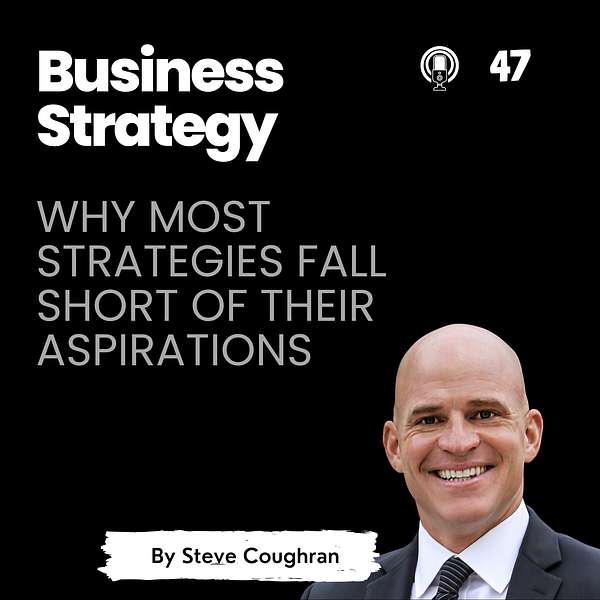
Business Strategy and Finance
Welcome to the Business Strategy and Finance Podcast, hosted by entrepreneur, founder, investor, CFO, and content creator Steve Coughran. In each episode, you'll discover strategies for attracting more customers, boosting profitability, and increasing your company's value, all drawn from Steve’s extensive experience in turning around and growing companies from millions to billions in revenue. By blending strategic principles with essential financial fundamentals, Steve provides actionable insights to help you optimize and maximize the value of your business.
Business Strategy and Finance
47: Why Most Strategies Fall Short of Their Aspirations
In this episode of the Business Strategy podcast, host Steve Coughran delves into the heart of why many strategies don't live up to their aspirations. As we explore the conventional process followed by most companies, we'll discover how to bolster the odds of your strategy's success. Last fall, numerous businesses were engrossed in refining their budgets and securing approvals for the forthcoming year. Regular listeners will recall my skepticism toward traditional budgets that rigidly set annual figures, serving more to command and control teams than to foster agility and insight. My advocacy leans towards forecasting—a dynamic, both proactive and reactive approach that enhances an organization's predictive capabilities. Yet, many companies remain entrenched in the budget-making process, rigidly linking compensation to these budgets, and enforcing them as if they were immutable, thereby resorting to manipulation, fear, and guilt to force plans into fruition, a method that rarely proves effective. A critical observation I've made is that too many companies erroneously regard the formulation of a budget, complete with lofty sales and profitability targets, as the cornerstone—and mistakenly, the initial step—of strategic planning. To be clear: a budget is not synonymous with strategy. Merely setting ambitious financial targets is no guarantee of their realization, particularly if ensnared by two common pitfalls. These errors are so widespread that I encountered them firsthand in my early days as a business owner. The first is the tendency to draft bold profitability projections, fueled by an optimism bias. Although ambitious goals are not inherently problematic, such optimism frequently clashes with the practical challenges of meeting those objectives. The second error is devising strategies that are overly cautious and fail to match the scale of the ambitions these numbers represent.
Disclaimer:
The views expressed here are those of the individual Coltivar Group, LLC (“Coltivar”) personnel quoted and are not the views of Coltivar or its affiliates. Certain information contained in here has been obtained from third-party sources. While taken from sources believed to be reliable, Coltivar has not independently verified such information and makes no representations about the enduring accuracy of the information or its appropriateness for a given situation.
This content is provided for informational purposes only, and should not be relied upon as legal, business, investment, or tax advice. You should consult your own advisers as to those matters. References to any securities or digital assets are for illustrative purposes only, and do not constitute an investment recommendation or offer to provide investment advisory services. The Company is not registered or licensed by any governing body in any jurisdiction to give investing advice or provide investment recommendations. The Company is not affiliated with, nor does it receive compensation from, any specific security. Please see https://www.coltivar.com/privacy-policy-and-terms-of-use for additional important information.
